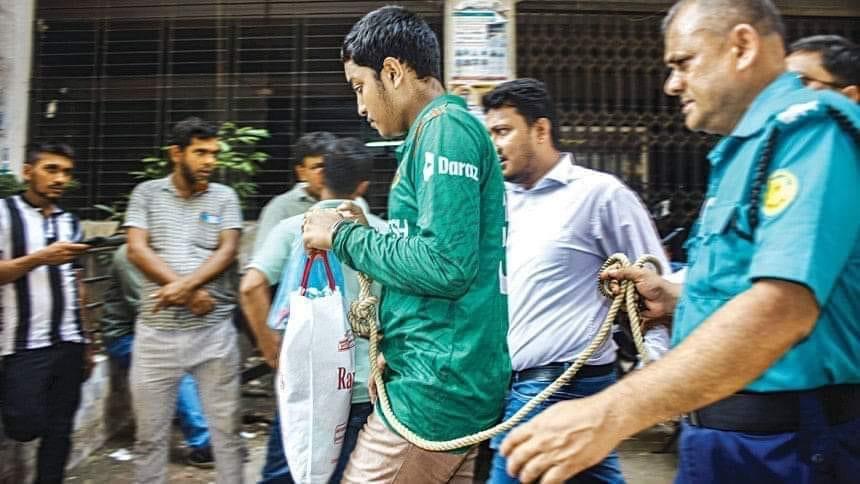How the laws of the lands were violated by granting a minor a seven-day remand order…. even for a day

On Saturday, a Dhaka court placed 17-year-old Hasnatul Islam Faiyaz, an eleventh-grade student at Dhaka College, on a seven-day remand.
He is accused of killing a police officer during the quota protest on July 24, according to a case filed with Jatrabari police station.
Faiyaz’s uncle, Md Shamim, stated at the Dhaka chief metropolitan magistrate’s court that Faiyaz was taken from his home on Wednesday night but was only brought before the court on Saturday.
“We have been outside the court every day since Wednesday searching for Faiyaz, as we could not find any information about him,” Shamim told New Age.
A day later, a juvenile court in Dhaka overturned the seven-day remand and declared Faiyaz a juvenile.
Judge Roksana Begum Happy of Juvenile Court-3 made this ruling after Faiyaz’s lawyer challenged the legality of the lower court’s decision, according to Sub-Inspector Mohammad Asaduzzaman, the general recording officer at Jatrabari Police Station.
During the hearing, Faiyaz’s lawyer, Mozharul Islam, informed the court that despite Faiyaz being 17 years old, Dhaka Metropolitan Magistrate Shanta Akhter had placed him on remand as an adult the previous day.
The lawyer argued that the remand order should be annulled, as all documents supporting Faiyaz’s status as a juvenile had been submitted.
At one point, the juvenile court requested an explanation from Moradul Islam, an inspector with the Detective Branch (DB) of Police and the investigation officer for the case. After reviewing all the documents, the IO confirmed that Faiyaz was indeed 17 years old.
Following this, the judge examined the documents, revoked the seven-day remand order, and directed that Faiyaz be transferred to the Tongi Child Correctional Centre in Gazipur.
Although the Juvenile Court later overturned the Dhaka lower court's order, I, as a law graduate from Dhaka University, am providing an explanation for the initial gross violation of the law that occurred by granting a seven-day remand for Faiyaz.
This explanation will be presented in straightforward language to make it understandable for everyone.
1. Many of you may not be aware, but there is a law called the Children Act-2013, and the provisions of this specific law take precedence over all other existing laws.
Section 3 of the Children Act clearly states: “Notwithstanding anything contained in any other law for the time being in force, the provisions of this Act shall have effect.”
This means that regardless of what is stated in other laws concerning the trial, arrest, or detention of an accused, if the accused is a child, then everything must be conducted according to the Children Act, and no other law will be applicable.
2. The question is— According to the law, was Faiyaz a 'child'?
The answer is— Absolutely, he was a child. His birth certificate and academic certificates were presented in court by his lawyer, which indicate that he is 17 years and 3 months old. Faiyaz passed his SSC in 2024 and has just been admitted to the first year of intermediate at Dhaka College; his classes haven’t even started yet.
Section 4 of the Children Act clearly states that anyone under the age of 18 is considered a child. Therefore, no proceedings outside the scope of the Children Act can be conducted against Faiyaz.
3. He has been tried in the magistrate court like everyone else. However, according to the Children Act, only a 'Children’s Court' has the jurisdiction to try cases involving children, under no circumstances should any other court handle such cases. This means that the entire judicial process concerning him has been beyond the legal process.
4. Look at the attached picture. He is handcuffed, and his hands and legs are bound with ropes, as if he is a major criminal!
However, according to Section 44(3) of
the Children Act, the police are prohibited from using handcuffs or ropes on a
child after arresting them.
5. There is another serious allegation from Faiyaz’s family. After his arrest, they were not informed about his whereabouts for 4 days. The police presented him in court only after four days, and even then, the family was not informed. The family members searched for him every day in the court premises. Finally, on the fourth day, they found him by coincidence. This is a serious violation of the law. There was a mandatory legal requirement to inform the family immediately upon his detention. Moreover, even when trying a child under the Children Act, it is a legal provision to keep the guardian with the child in court. But the police did everything without informing the family. There was no information about him for four days. This is a gross violation of the law.
6. Can a court grant remand to a child?
The answer is— No, it cannot. There is no provision in the law for placing a child on remand.
7. Was Faiyaz entitled to bail?
Certainly. Section 52 of the Children Act provides clear guidelines on bail.
The Children Act is a specific law. According to this law, the police could have granted bail to the child before presenting him in court. According to this law, there is no need to even consider whether the offense is bailable or non-bailable.
Moreover, if the police did not release him for any specific reason and sent him to the children’s court, the child would certainly have the right to bail from there. Under no circumstances is there an option to place him on remand.
8. If, for any specific reason, immediate bail is not granted, then under Section 26 of the Children Act, the court can order the child to be kept in safe custody. This safe custody does not mean ordinary jail. Additionally, the law states that if considering safe custody is necessary (in certain special circumstances), it must be considered as a last resort and for the shortest possible time. This is an exceptional issue, and the normal rule is that regardless of whether the offense is bailable or non-bailable, bail must be granted.
Even if a child is convicted of a crime by the court and the crime is of the highest severity, such as the death penalty or life imprisonment, the court still cannot send a child to an ordinary jail. The court can only send the child to a 'Child Development Center'. Details of this are provided in Section 34 of the law
Yet, in Faiyaz’s case, which is related to the quota movement, he has been sent to a regular jail while still under trial (the crime has not been proven), and that too with a 7-day remand. This indicates a severe deviation from the law.
Moreover, the issue with Faiyaz is not just a grave violation of domestic law. Bangladesh is a state party to the United Nations Convention on the Rights of the Child (CRC).
What has happened to Faiyaz is also a serious violation of the UN Convention on the Rights of the Child (CRC).
—---


